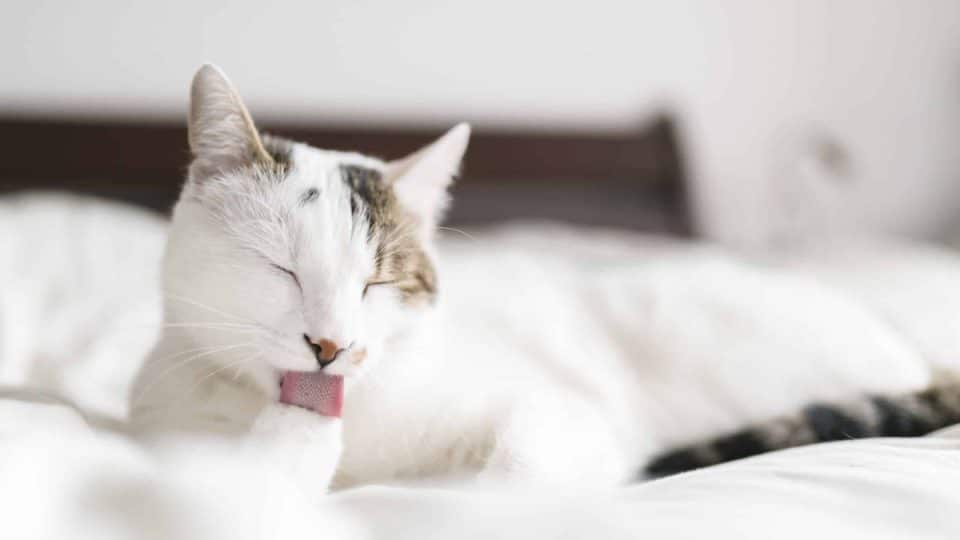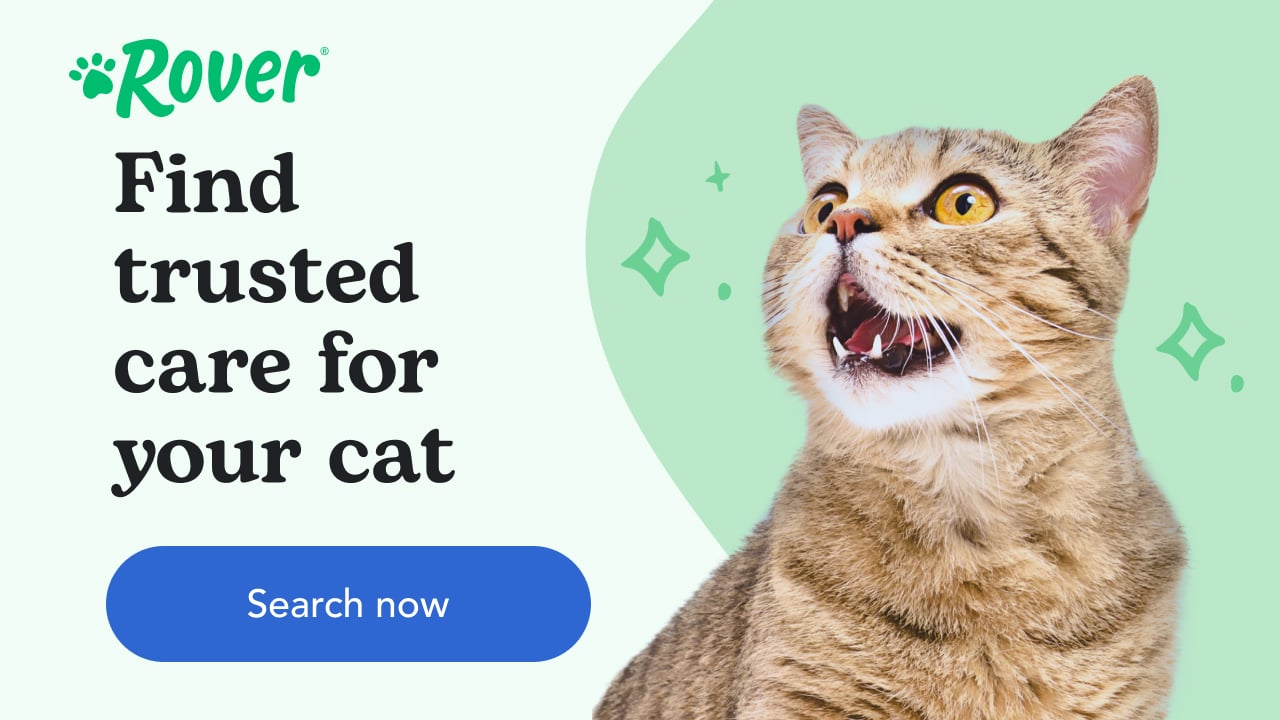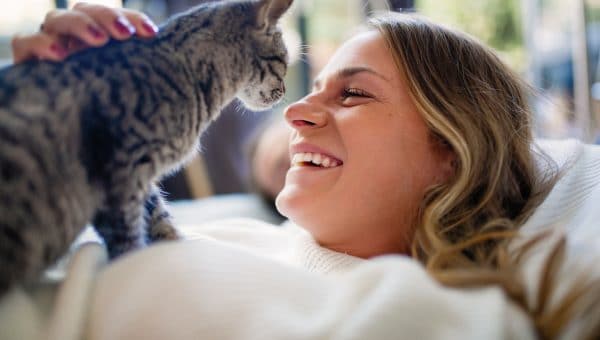Cats may lick you for many reasons, from displaying affection to spreading their scent. And while some cat parents might not mind the occasional lick, others might find it uncomfortable, as a cat’s tongues can be rough on the skin. When a cat has kittens, they regularly lick them as a way to keep them cleaned and groomed. Grooming can remove loose hairs, fleas, or anything that might get trapped in the fur, as well as help cats cool down. The most common reason cats lick you is to groom you.
Here are some of the reasons cats lick you. We’ll also dive into how to stop your cat from licking you if it becomes a problem.
Your Cat Is Grooming You
Your cat might be grooming you just like a mother cat would groom her kittens. One of the reasons cats’ tongues are rough is to help them groom themselves—they have tiny little spines which are great at getting out tangles and removing matted fur. If you feel a little nip while your cat is licking you, don’t worry. Biting and licking are both parts of a cat’s grooming routine that helps them get rid of tangles. Your cat doesn’t usually mean any harm by biting.
If you’re not a fan of your cat licking you, you can always try to distract her with a treat or toy instead.
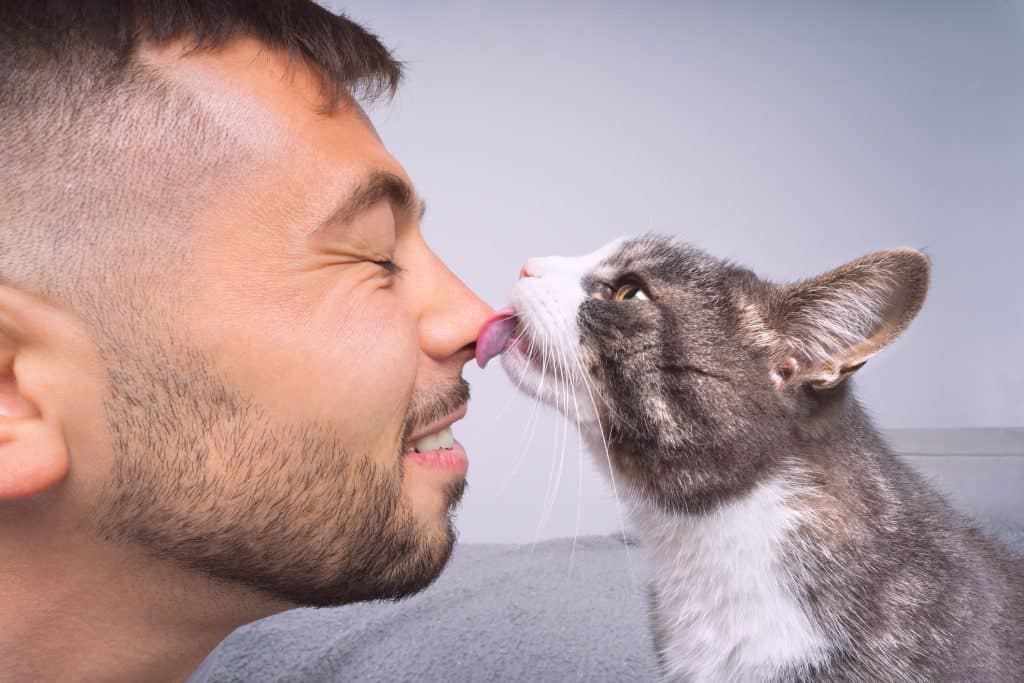
iStock/Daria Kulkova
Your Cat Is Bonding With You
One of the main reasons cats can lick their owners is to build a bond and show affection. In fact, a cat licking you shows that they see you as part of their family.
While your cat licking you is a way to show affection, it’s not the most common behaviour for showing their love. Other ways cats show they want your attention includes rubbing up against you, ‘making biscuits,’ and, strangely enough, following you to the bathroom.
Your Cat Is Letting You (And Other Cats) Know You’re Part Of The Family
Is it a territorial move? Possibly.
When a cat licks you, they are sharing their scent through their saliva. This marks you as part of their family! That way when you come into the house or enter a room, they can smell that you are safe and trustworthy even before they see you.
Cats can also mark their territory by rubbing up against you or objects in their environment, or by urine marking their space (such as your carpet or garden for example).
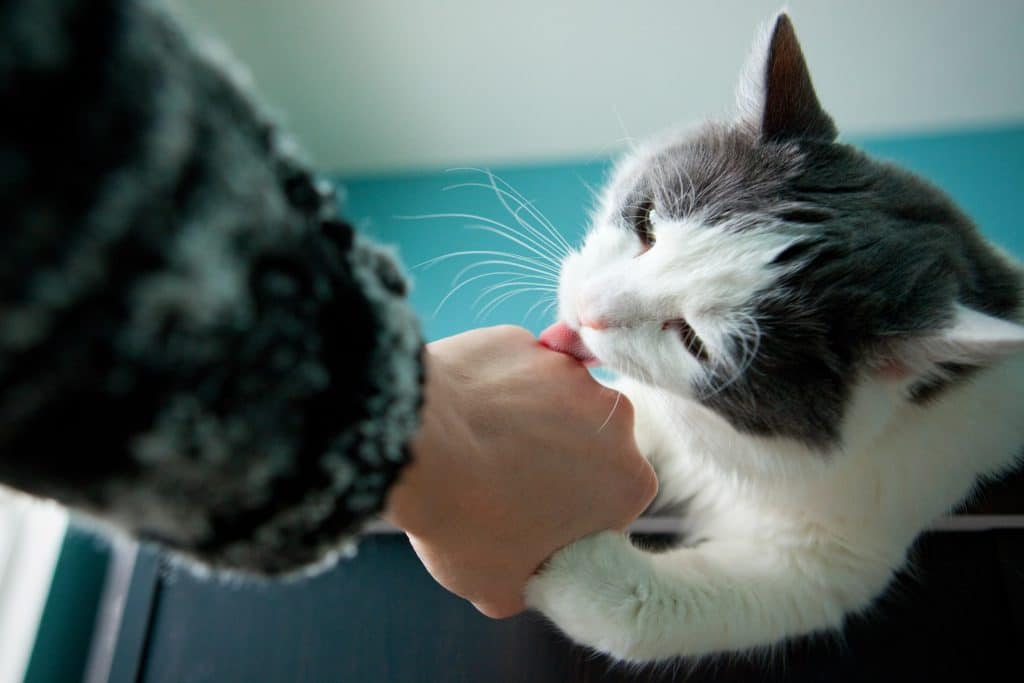
iStock/sdominick
Your Cat Is Actually Smelling You
Cats have a huge number of scent receptors and can smell in two different ways. Not only through their noses, but also by tasting and analysing scents through an organ on the roof of their mouths—the vomeronasal organ.
Like other animals, cats explore the world with their mouths. Your cat is licking you and using their scent and taste organs to get to know their environment, fellow cats, and you better!
Your Cat Is Seeking Attention
Cats are intelligent animals and may have developed a learned behaviour related to licking. If cats notice that you give them attention when they lick you, they’ll lick you more to get more attention!
Other common ways cats might ask you for attention include meowing at you, bringing you toys, and following you around.
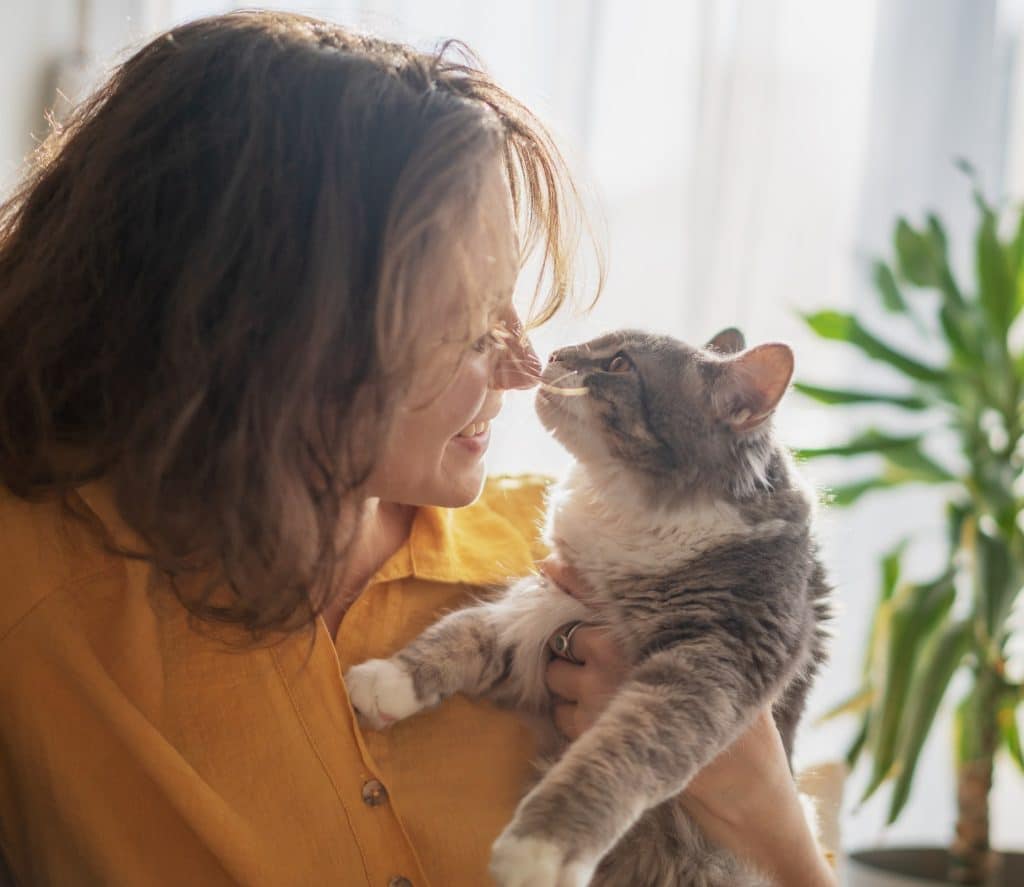
iStock/Olezzo
Your Cat Is Displaying Kitten-Like Behaviour
When they’re nursing, kittens suckle at their mothers, which provides milk—but also comfort—to the kitten. So if a cat is weaned too early from their mother, they may use licking to replicate that behaviour as a way to seek comfort when stressed or anxious.
Kneading is another kitten behaviour to look out for that cats might perform to seek comfort or self-soothe.
Your Cat Is Licking You Just Because You Feel (Or Taste) Good
For cats, licking can release endorphins. This is because cat saliva contains pheromones which create an emotional response when they lick, making them feel happy and secure.
On the other hand, if you’ve made delicious food with chicken or tuna, your cat is licking you because you taste yummy like dinner!
Your Cat Is Trying To Alleviate Anxiety
Cats lick themselves and us as a form of stress relief. Take a minute to stop and think about whether your cat might be anxious due to a multitude of stressors.
Having an anxious cat can be a worry for pet parents. But there are some solutions you can try. For example, if you have builders in the house for a period of time, try keeping your cat in another area of the house where they won’t be disturbed by the commotion. You can then monitor your cat to see if they are doing better. Another possible way to reduce your cat’s anxiety is by providing them with calming pheromones.
If the behaviour persists, then make sure to speak to your vet for expert advice. They’ll be able to reassure you of the best course of action to take.
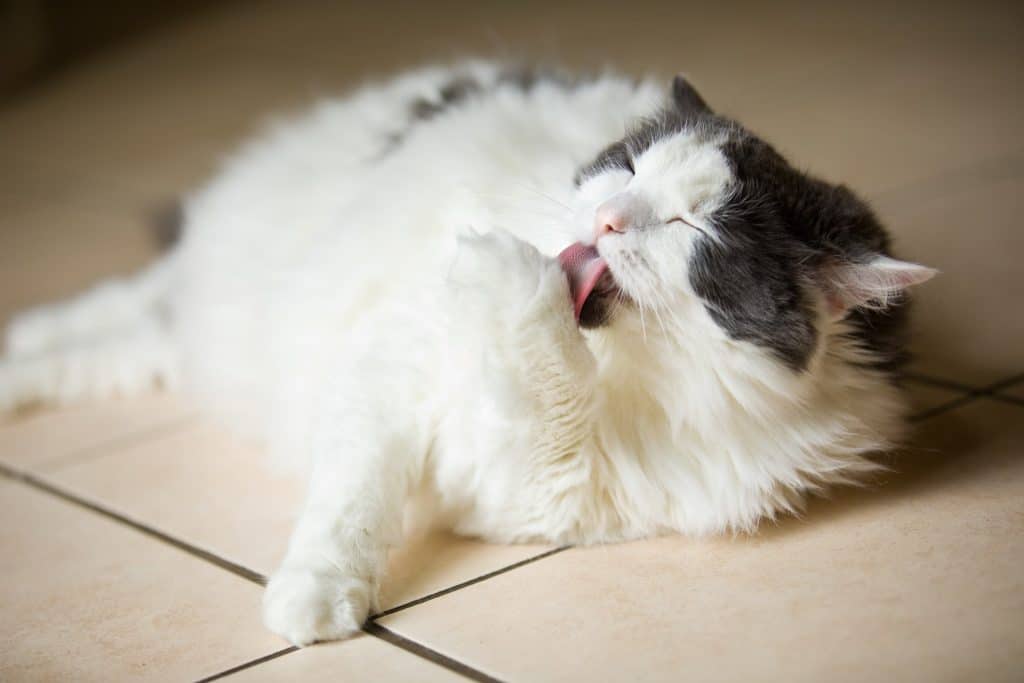
iStock/sdominick
Why Does My Cat Lick Me Then Bite Me?
Or maybe your cat bites then licks you? Whichever way around your cat displays these behaviours, the explanation is similar. Your cat may be showing you they don’t harm or they may be asking you to stop what you’re doing.
Two of the most common reasons cat bites are that they either want to play or that they’re not in the mood to be pet. Sometimes cats can get a bit overstimulated, and that doesn’t mean you’re doing anything wrong.
If your cat frequently bites, pay closer attention to their body language. If they have their eyes closed, it may mean there’s a certain area they don’t want to be touched. You can start off stroking them for just a short time, or giving them a quick head scratch, and if you hear them purring or enjoying it, you’ve got the go-ahead!
Don’t be discouraged by the first nip. It takes time to learn the subtler signs of when petting becomes too much for them. Always, however, let your cat walk away when they’re done so that they don’t feel like they have to resort to biting.
Reading Your Cat’s Body Language
Determining why your cat is licking you comes down to understanding their body language. Cats are great at showing rather than telling, so it’s crucial you pay attention to their body language and see if they’re happy or stressed. Below are some common examples of stressed versus happy cat body language.
| Your cat is stressed/anxious | Your cat is happy |
| Hiding | Purring |
| Withdrawing | Slow blinking |
| Destructive scratching | Head bunting |
| Lethargy | Perching |
| Frequent escape attempts | Kneading |
Is It Safe To Let Your Cat Lick You?
As long as you’re sure it’s not developed into an anxious, compulsive behaviour, then it’s fine to let your cat lick you!
However, if you have an open wound, it’s best to keep your cat from licking in that area. Cats carry bacteria in their mouths, which can lead to an infection in an open wound. Another reason not to let your cat lick you is if you’ve been in contact with harmful toxins. Cats may get sick from licking them off your skin.
If you’re in any doubt about whether or not to let your cat lick you, check with your vet!
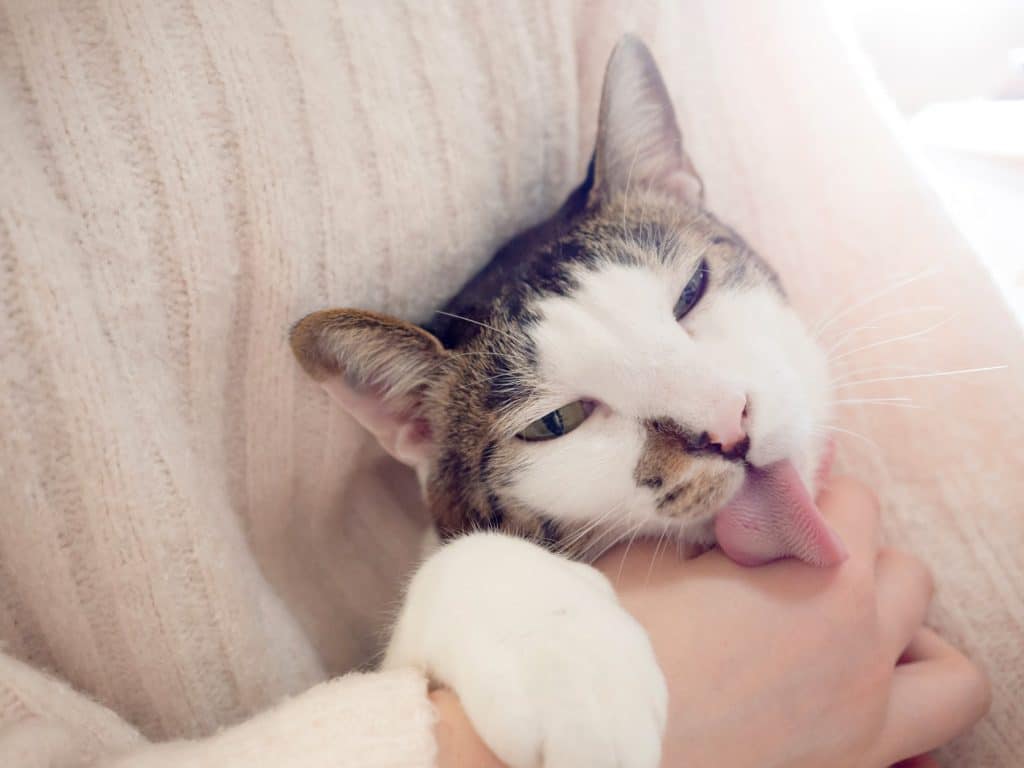
iStock/SetsukoN
How To Get Your Cat To Stop Licking You
Some people can find it unpleasant as cats’ tongues are very rough on the skin. Others might be busy and not want their cats to lick them.
If you want to stop your cat from licking you, first make sure your cat isn’t distressed or displaying any other alarming behaviour signs, like destructive scratching. Then, you can use the following distractions:
- An interactive toy
- A cosy scratching post
- A treat as soon as they stop licking.
Takeaway
Overall, licking is just one of the ways for your cat to show you that they love you. Along with head bunting, sleeping on you, cuddling, body language, and greeting you at the door when you come home from work—cats have all kinds of ways to show you that you’re their favourite human ever!
However, if they’re licking you excessively and displaying other signs of anxiety or stress, contact a vet.
